Media and international attention may be declining, but the momentum for the “Unity Intifada” is not, writes Yara Hawari.
By Yara Hawari
Al-Shabaka
 The ongoing Palestinian uprising against the Israeli settler-colonial regime in colonized Palestine did not begin in Sheikh Jarrah, the Palestinian neighborhood of Jerusalem whose residents face imminent ethnic cleansing. While the threat of the expulsion of these eight families certainly catalyzed this mass popular mobilization, the ongoing uprising is ultimately an articulation of a shared Palestinian struggle in the wake of over seven decades of Zionist settler-colonialism.
The ongoing Palestinian uprising against the Israeli settler-colonial regime in colonized Palestine did not begin in Sheikh Jarrah, the Palestinian neighborhood of Jerusalem whose residents face imminent ethnic cleansing. While the threat of the expulsion of these eight families certainly catalyzed this mass popular mobilization, the ongoing uprising is ultimately an articulation of a shared Palestinian struggle in the wake of over seven decades of Zionist settler-colonialism.
These decades have been characterized by continuous forced displacement, land theft, incarceration, economic subjugation, and the brutalization of Palestinian bodies. Palestinians have also been subjected to a deliberate process of fragmentation, not simply geographically — into ghettoes, Bantustans, and refugee camps — but also socially and politically.
Yet the unity witnessed over the last two months as Palestinians across colonized Palestine and beyond mobilized in shared struggle with Sheikh Jarrah has challenged this fragmentation, to the surprise of both the Israeli regime and the Palestinian political leadership alike.
Indeed, popular mobilization on this scale had not been seen for decades, not even during the Trump administration, which oversaw the recognition of Jerusalem as Israel’s capital, the normalization agreements between Israel and various Arab states, and the further acceleration of Zionist settler-colonial practices.
Beyond mobilizing on the streets, Palestinians have been using creative forms of resistance against their subjugation. This includes the revitalization of grassroots campaigns to save Palestinian neighborhoods in Jerusalem from destruction and ethnic cleansing, the disruption of the Israeli regime’s economy, and the continuous engagement of a globalized world with clear messages demanding freedom and justice for Palestinians.
Jerusalem: A Catalyst for Unity
As in so many Palestinian communities, the residents of Sheikh Jarrah have been facing ongoing and imminent expulsions and ethnic cleansing for decades. Indeed, Palestinians in Sheikh Jarrah have long been engaged in legal battles against the Israeli regime in an attempt to forestall expulsion, which would serve Israel’s ultimate goal of the total Judaization of Jerusalem.
In late April 2021, the Jerusalem District Court rejected the appeals of residents of Sheikh Jarrah against what the courts refer to as the “eviction” of eight Palestinian families, ordering that they vacate their homes by May 2, 2021.
Refusing this order, the families threw their weight onto the “Save Sheikh Jarrah” grassroots campaign to protect the neighborhood from ethnic cleansing. The campaign, which has been recently popularized through social media, has attracted both massive local participation and international attention, not least because it encapsulates the Palestinian experience of dispossession. As a result, it has given momentum to other campaigns to “save” neighborhoods across colonized Palestine from ethnic cleansing and colonization, including Silwan, Beita, and Lifta.
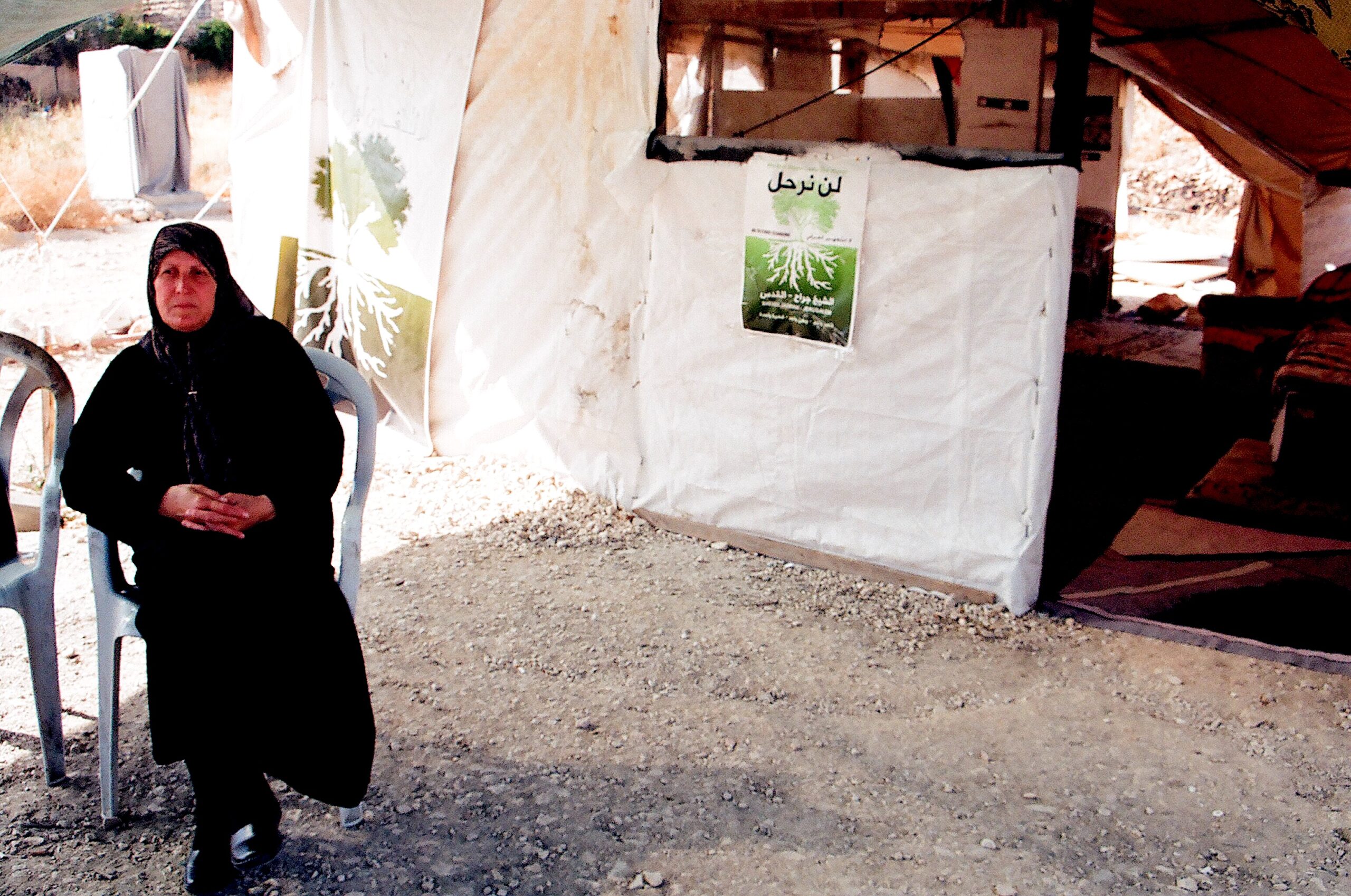
Umm Kamel Al-Kurd, a Palestinian, in the protest tent in 2009, a year after she was evicted from her home in Sheikh Jarrah in 2008. (Bekmaw, CC BY-SA 4.0, Wikimedia Commons)
Over the last two months, Palestinians across colonized Palestine have been protesting in shared struggle with Sheikh Jarrah, including Palestinians with Israeli citizenship in cities like Haifa, Jaffa, and Lydd. These protests and demonstrations were met with violent repression from the Israeli regime, a reaction that is neither unprecedented nor unexpected. Indeed, during the Second Intifada, 13 Palestinian citizens were killed at protests by Israeli regime forces in the deadliest crackdown since Land Day 1976.
Throughout this ongoing uprising, violence from regime forces has been accompanied by armed Israeli settler mobs attacking and lynching Palestinian citizens, and raiding and destroying Palestinian homes, vehicles, and businesses.
However, it was the several days of protests at the al-Aqsa mosque compound that dominated international media, particularly as this was the site of successful mass protests in 2017 against the electronic barriers placed at the entrance to the compound. These latest protests in mid-May were also met with violent repression from Israeli security forces who stormed the compound, injuring hundreds of Palestinian worshipers with rubber bullets, gas canisters, and stun grenades.
As a result of this assault and the Israeli regime’s ongoing ethnic cleansing attempts in Palestinian Jerusalem, the Hamas government in Gaza retaliated with rockets targeting the city.
Israel responded with over 10 days of heavy bombardment of Gaza, which ultimately killed 248 Palestinians, including 66 children. Despite claims by the Israeli regime that it was only targeting Hamas military infrastructure, vital civilian infrastructure, entire residential buildings, and even media towers, were destroyed. UN Human Rights Chief Michelle Bachelet has said that these bombardments on Gaza may amount to war crimes.
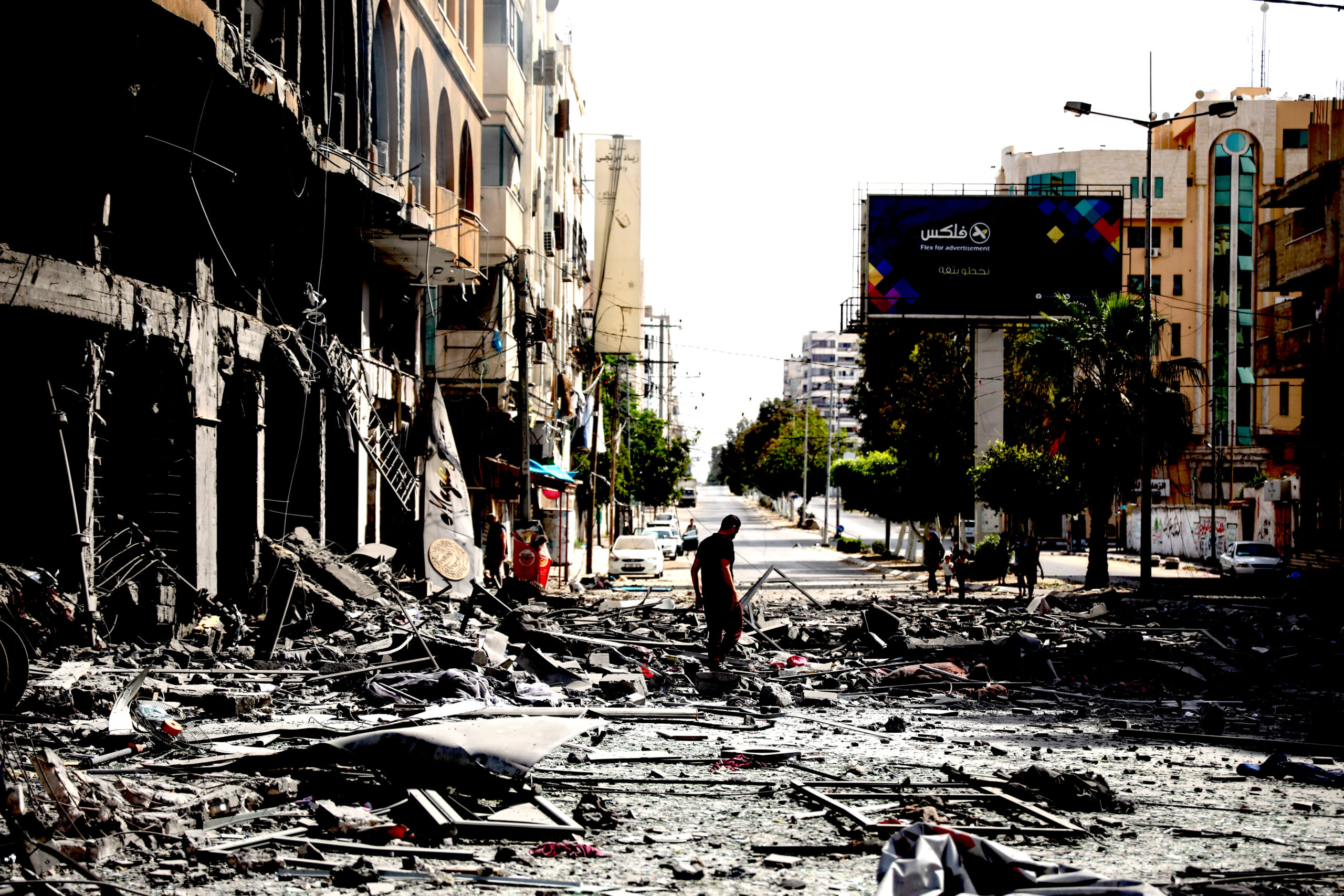
A Palestinian man in the ruins of Al Jawhara Tower at the center of Gaza CIty after it was bombed the previous night, May 12. (M. Hajjar/NRC)
Disrupting the Israeli Regime’s Economy
As Gaza was under attack, grassroots mobilization across the rest of colonized Palestine continued. On May 18, Palestinians called for a general strike in arguably one of the biggest shows of collective unity in years.
It was soon adopted by the High Follow-Up Committee for Arab Citizens of Israel and, later, by the Palestinian Authority (PA) in the West Bank. But it was grassroots actors who took control of the narrative through various statements in Arabic and English calling for widespread participation and international support: “Launched from Jerusalem and extending across the world, we call on your support in maintaining this moment of unprecedented popular resistance,” one statement read.
The strike was organized in response to the attacks on Gaza and the struggle on the streets of Jerusalem. It saw wide participation and was particularly important for Palestinians with Israeli citizenship, who reiterated once again their connection to — and shared struggle with — Palestinians in Gaza and Jerusalem. It was also, however, a tactic of effective disruption of the Israeli economy.
At 20 percent of the population of Israel, Palestinians with Israeli citizenship constitute a large part of the workforce; 24 percent of nurses and 50 percent of pharmacists in Israel, for instance, are Palestinian.
The Israeli construction sector is also mostly made up of Palestinians, predominantly from the West Bank, but also Palestinian citizens of Israel. On the day of the strike, nearly all manual laborers participated, which meant that the industry was completely put on hold for an entire day. Palestinian trade unions also came together ahead of the strike and called on international trade unions to stand in solidarity with them, and to take action against Israeli oppression.
This kind of action was demonstrated by dockworkers in the Italian port of Livorno, who refused to load Israeli weapons and explosives onto ships a few days ahead of the strike, stating that: “The port of Livorno will not be an accomplice in the massacre of the Palestinian people.”
Protests continued in the days following the strike, albeit on a smaller scale and with less media attention. Nonetheless, the strike had lit a spark and the focus on economic oppression became a mobilizing theme. Building off the success of the strike, several weeks later, a campaign to promote Palestinian economic purchasing power was announced. Dubbed “Palestine Economic Week,” the event stressed that, despite the economic chokehold that the Israeli regime has placed on Palestinians, they still have collective purchasing power. This rhetoric is particularly reminiscent of the First Intifada, in which popular measures like the cooperative movement and the call to boycott Israeli produce challenged economic subordination and dependence on the Israeli regime.
Join us June 6-12 for Palestine Economic Week. Commit and get your workplace to commit to BDS, support our economy, and advocate for Palestinian liberation. #SaveSheikhJarrah #SaveSilwan pic.twitter.com/3d3XJQlw2h
— Mohammed El-Kurd (@m7mdkurd) June 1, 2021
The Zionist settler-colonial project has deliberately subjugated the Palestinian economy, which was shattered by the foundation of the Israeli state in 1948, and the subsequent occupation of Palestinian land. As the Zionist regime conquered most of the productive and agricultural sectors, it barred Palestinians from most areas of the new economy. This situation expanded to the West Bank and Gaza following the 1967 war, which brought these territories under Israeli military occupation.
A series of “peace” agreements during the Oslo Accords of the early 1990s brought Palestinians under further economic subjugation, effectively handing over direct and indirect control of the Palestinian economy to the Israeli regime. The agreements also deepened the social fragmentation of Palestinians in the West Bank and Gaza. While some claimed the economic protocols would bring economic prosperity to all, in reality, they nurtured Palestinian capitalist cronyism, further entrenching the wealth gap and class divisions in society.
Palestine Economic Week encouraged various activities across colonized Palestine — from Haifa to Ramallah and beyond — to promote Palestinian local produce and products over Israeli ones that have monopolized the market with their abundance and competitive prices. In this way, Palestine Economic Week put forward a more holistic notion of colonial domination as intertwined with capitalism, wherein economic liberation is a key aspect of the broader national liberation struggle.
Understanding the Unity in the Unity Intifada
Following the May 21 “ceasefire” between Israel and Hamas, international media attention was diverted away from the uprising, and the inevitable discussions on the reconstruction of Gaza have since dominated the news cycle. Despite the massive destruction and causalities in Gaza, though, many Palestinians considered the outcome a victory for Hamas.
It is important to stress however, that the uprising, which began before the bombing of Gaza, goes beyond Hamas and its victory narrative. As one Palestinian colleague in Gaza noted to this author: “This time, it felt different in Gaza. This time, we felt as though we were not alone.” Indeed, given the mass mobilization across colonized Palestine and the revival of grassroots connections in the face of enforced fragmentation, this new uprising has been dubbed the “Unity Intifada.”
Around the time of the strike, a manifesto titled “The Dignity and Hope Manifesto of the Unity Intifada” was published online, laying out a rejection of this enforced fragmentation:
“We are one people and one society throughout Palestine. Zionist mobs forcefully displaced most of our people, stole our homes and demolished our villages. Zionism was determined to tear apart those who remained in Palestine, isolate us in sectional geographical areas, and transform us into different and dispersed societies, so that each group lives in a separate large prison. This is how Zionism controls us, disperses our political will and prevents us from a united struggle against the racist settler colonial system throughout Palestine.”
The manifesto goes on to detail the various geographic fragments of the Palestinian people: the “Oslo Prison” (West Bank), the “citizenship prison” (lands occupied in 19481), the brutal siege in Gaza, the system of Judaization in Jerusalem, and those in permanent exile. The imposition of this colonized geography on Palestine, characterized by concrete walls, checkpoints, gated settler communities, and wired fences, has left Palestinians living in fragments separated and isolated from one another.
As the manifesto notes, this has not happened inevitably or at random. Rather, this deliberate policy of divide-and-conquer has been implemented by the Zionist regime to undercut a united Palestinian anti-colonial struggle.
But Palestinians have not been passive. Over the years, many grassroots groups have made efforts to disrupt the fragmentation, including various youth protest movements like the 2011 demand for political unity between the West Bank and Gaza, the 2013 anti-Prawer demonstrations against the Israeli policy to ethnically cleanse Bedouins in the Naqab, and the campaign to Lift the Sanctions imposed by the PA on Gaza.
[Related: THE ANGRY ARAB: Abbas & His Latest ‘Threat’]
More recently, Palestinian women established Tal’at, a radical feminist movement that seeks — among many things — to transcend this geographic division while asserting that Palestinian liberation is a feminist struggle. This latest articulation of Palestinian unity follows from these continuous efforts to revitalize a shared Palestinian struggle.
Yet much of the international discourse has failed to recognize this. Indeed, the unfolding violence in the 1948 territories has often been misleadingly dubbed as intercommunal violence teetering on the edge of a civil war between Jews and Arabs, a framing that distinctly separates Palestinian citizens of Israel from Palestinians in Gaza and Jerusalem. This assessment fails to describe the reality of apartheid, in which Israeli Jews and Palestinian citizens of Israel live totally separate and unequal lives.
In fact, this inherits a decades-old tendency of referring to Palestinians with Israeli citizenship as “Israeli Arabs” in an attempt to disconnect them from their Palestinian identity. At best, their situation is portrayed in the mainstream as the unexceptional case of a minority group facing discrimination by the Jewish majority, rather than as the indigenous survivors of the 1948 ethnic cleansing who continue to resist settler-colonial erasure. The failure to recognize the latest protests within the 1948 territories as a distinct part of a greater, united Palestinian uprising is especially remarkable considering their aesthetics; most demonstrations were characterized by a sea of Palestinian flags and the sound of distinctly Palestinian chants.
Gaza, too, has slowly been disconnected from the Palestinian struggle by these mainstream discourses, discussed as an entirely separate issue to that of the rest of colonized Palestine. More often than not, the Israeli regime’s continuous bombardment is explained away as a war between Israel and Hamas, a distorted narrative that deliberately detracts from the fact that Gaza is, indeed, the linchpin of the Palestinian struggle, as Tareq Baconi argues.
Unity Against all Odds
While the range of mobilization and the scope of popular participation witnessed over the last few weeks have been impressive, the cost of this uprising has been, and continues to be, high.
In addition to the brutality in Gaza, Palestinians elsewhere throughout colonized Palestine have been subjected to brutal violence and arrests. In the last few weeks, under the Israeli regime’s “law and order” operation, thousands of Palestinian citizens of Israel have been arrested, most of whom are young, working-class men. The Israeli regime uses these mass arrests as a form of collective punishment to intimidate and frighten Palestinian communities.
In the West Bank, the PA is still committed to security coordination with the Israeli regime, and has been arresting various activists involved in the protests.
The arrest of political activists, especially those critical of the PA, is not new; it follows a pattern of political repression in both the West Bank and Gaza. Indeed, on June 24, PA security forces arrested and beat to death Nizar Banat, a well-known activist and critic of the regime. Since then, demonstrations have erupted across the West Bank calling for an end to PA President Mahmoud Abbas’ rule. The protests have been met with brute violence and repression, though this behavior is unsurprising. The PA is notorious for abusing its power through this kind of violent intimidation.
Palestinians chanting “your blood won’t be in vain,” during Nizar Banat’s funeral in occupied Hebron.
Calls for the PA to conduct “a thorough investigation” on itself are futile. There is no enigma in how or why Nizar was assassinated. Abbas must resign. pic.twitter.com/4A9kPvCcMF
— Mohammed El-Kurd (@m7mdkurd) June 25, 2021
The Fatah-dominated PA in the West Bank has been totally sidelined throughout the uprising, particularly in the face of Hamas’ victory narrative. Yet this uprising shows more than just the growing irrelevance of the PA and the struggle for legitimacy and power between the two dominant Palestinian parties. It has shown that grassroots and decentralized leadership can develop organically and outside of corrupt political institutions. It has also shown that Palestinians are hungry for unified mobilization.
The momentum for the uprising continues, and the feeling of unity is building despite the decreased media and international attention. Something has indeed changed: Palestinians are reclaiming a shared narrative and struggle from the Jordan River to the Mediterranean Sea. In doing so, they are recognizing that they face one single regime of oppression, even if it manifests in different ways throughout the fragmented Palestinian communities. Ultimately, just as the ones before it, this uprising has reiterated that the people are the locus of power through which Palestinian liberation must and will be achieved.
Yara Hawari is the senior analyst of Al-Shabaka: The Palestinian Policy Network. She completed her PhD in Middle East Politics at the University of Exeter, where she taught various undergraduate courses and continues to be an honorary research fellow. In addition to her academic work, which focused on indigenous studies and oral history, she is a frequent political commentator writing for various media outlets including The Guardian, Foreign Policy and Al Jazeera English.
This article is from Al-Shabaka.
The views expressed are solely those of the author and may or may not reflect those of Consortium News.

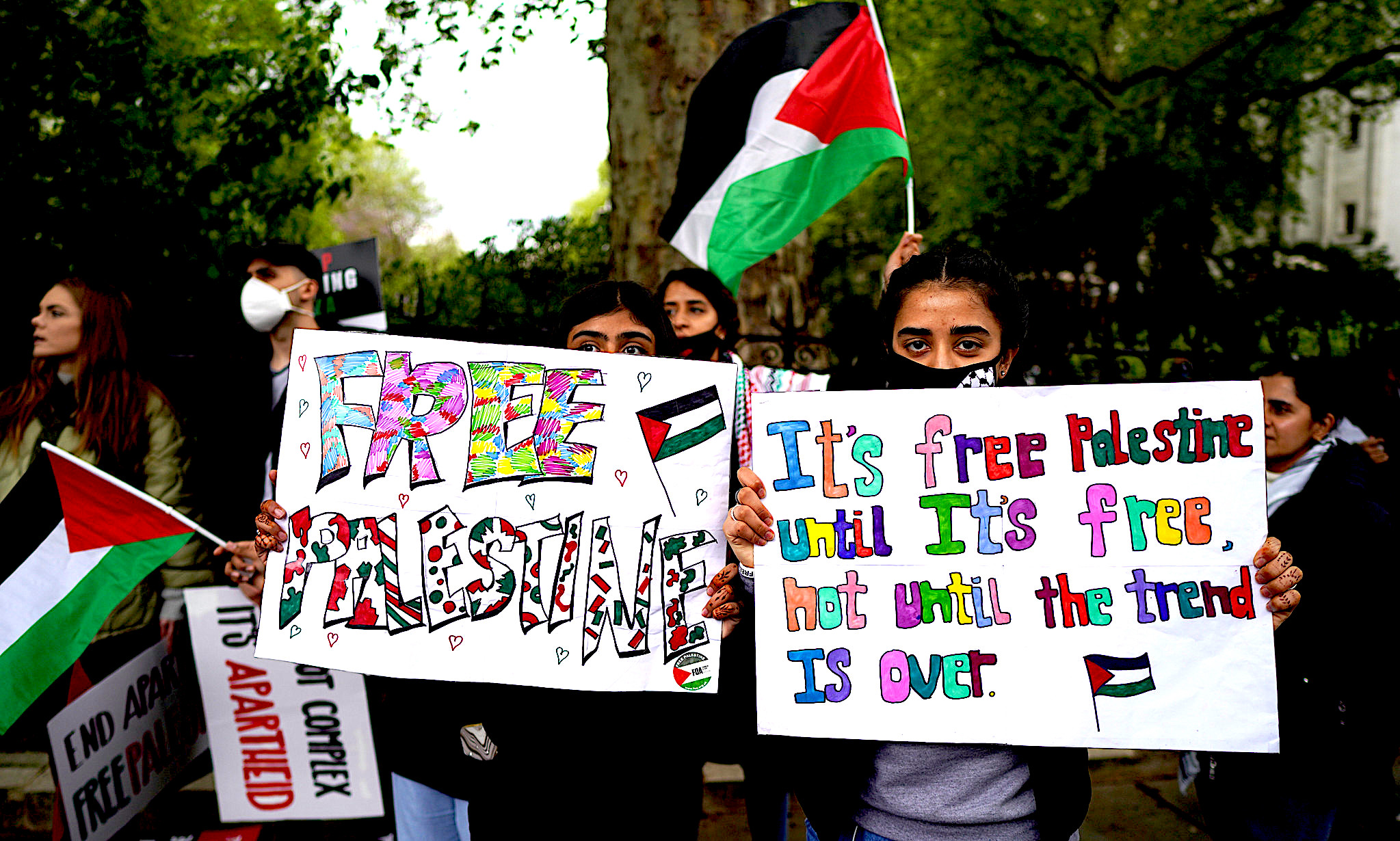
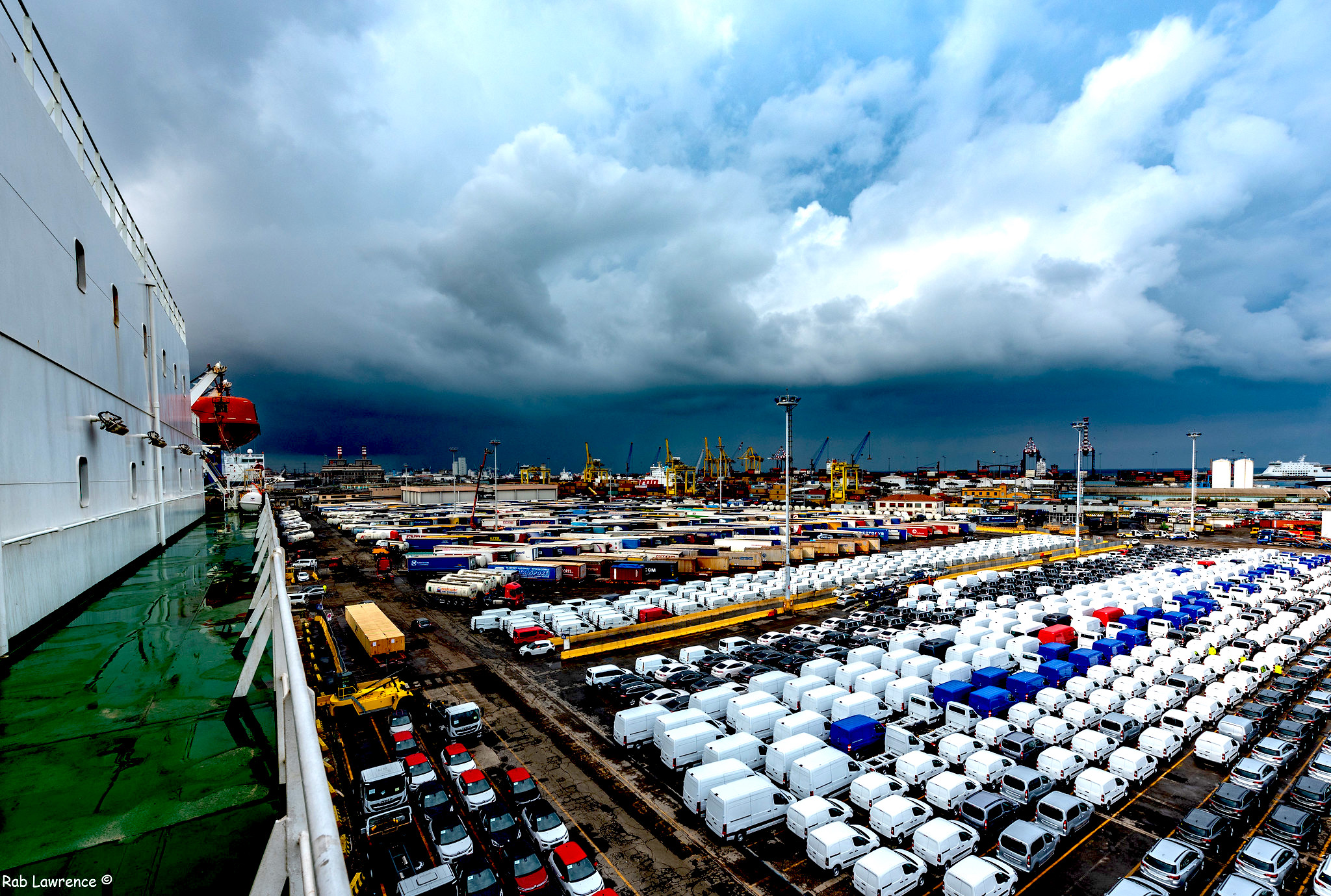
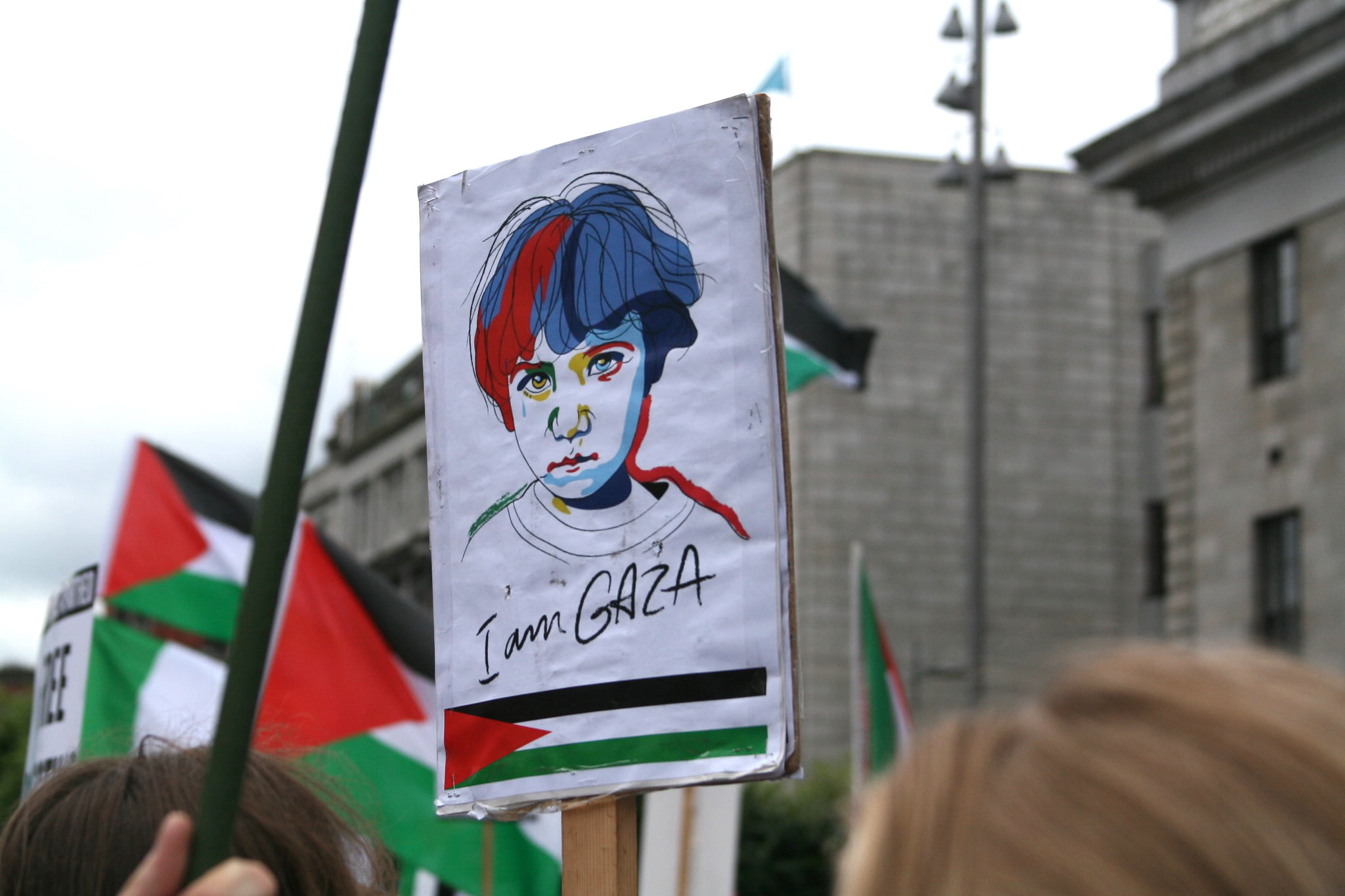
I have been hoping that Puerto Ricans might show the way for English speaking north Americans to become civilized. Now Puerto Ricans are joined by Palestinians and Columbians. The entire colonialist system of representative democracies is beginning to fall before the long march to real democracy.
“Something has indeed changed: Palestinians are reclaiming a shared narrative and struggle from the Jordan River to the Mediterranean Sea. In doing so, they are recognizing that they face one single regime of oppression, even if it manifests in different ways throughout the fragmented Palestinian communities. Ultimately, just as the ones before it, this uprising has reiterated that the people are the locus of power through which Palestinian liberation must and will be achieved.”
From the outside looking in, this laudable step might be followed by an effort to find support for your struggle within the the Jewish community in the same land. It is not only a struggle for Arab liberation for Jewish liberation as well; to join in an effort to create a nation where all are free and equal under the law.
Palestinians are, to me, analogs to Frank Herbert’s Fremen in his Dune novels, and of course, the evil Harkonnens, are their Zionist enslavers. Would that the results turn out similar.
Yara, I humbly ask you to please think about your use of the term “rubber bullet.” The term gives the connotation to people that these are actually rubber bullets, implying that they are much less lethal than actual bullets. They are not rubber bullets, even though they may be less lethal than “live” ammunition. In actuality, as you most likely know, they are rubber-coated steel bullets and slugs that can do lethal harm and damage. People who are not intimately informed about the issue will tend to be misled by the term “rubber bullet.”
Let us finally defeat this last settler colonial project called Israel. Let this apartheid project finally become simply a dark chapter in human history.